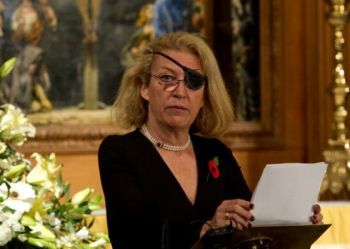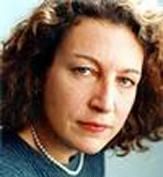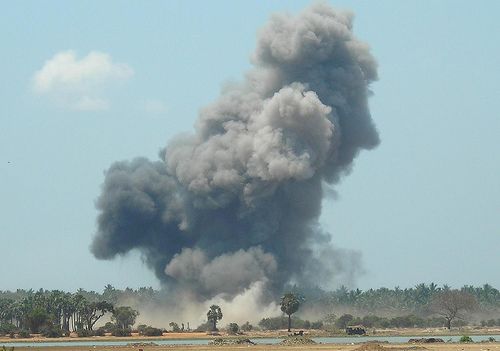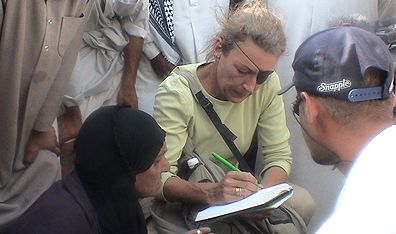
Publisher:
Bonnie King
CONTACT:
Newsroom@Salem-news.com
Advertising:
Adsales@Salem-news.com

~Truth~
~Justice~
~Peace~
TJP
Feb-22-2012 19:49


 TweetFollow @OregonNews
TweetFollow @OregonNews
Marie Colvin, Wounded While working in Sri Lanka in 2001 Dies in Syria
Salem-News.comA woman heroic among journalists, is killed in Syria...
 Marie Colvin, recognized as Best Foreign Correspondent in many Press Awards, was wounded in the eye when she was fired upon in Vavuniya, Sri Lanka in April 2001. |
(COLOMBO, Sri Lanka) -
 Marie Colvin |
In confirming the death of Marie Colvin, the Sunday Times editor said:
| “ |
an extraordinary figure, driven by passion to cover wars |
” |
Marie Colvin on CNN about war in Syria
In May 2009 Marie Colvin was in contact with LTTE, Sri Lankan officials and diplomats during the ‘White Flag surrender’ of LTTE Fighters and their families.
News Report by Marie Colvin on March 21, 2009:
by Marie Colvin
A THOUSAND amputees were among the wounded and dying waiting to be rescued from a beach in northeast Sri Lanka yesterday, according to aid agencies.
Frightened Tamil families, the latest victims of the country’s 26-year civil war, were hiding in makeshift trenches as they came under artillery fire while waiting to be evacuated from Puthumathalan beach.
 [Artillery in Maththalan-Vanni-March 2009] |
Last week the International Committee of the Red Cross removed 460 injured and their families from the area, using local fishermen to carry the wounded on wooden dinghies to the Green Ocean ferry leased for the operation. The ferry was due to return last night to rescue more of the injured.
Sophie Romanens, a Red Cross representative in Sri Lanka, said the scene was desperate. “The capacity for evacuation is far below the need,” she said. “We have to decide to take the casualties who are more badly injured and leave behind the ones who are less badly injured.” They are among 150,000 civilians trapped in an area of 13 square miles after fleeing a government offensive against the Liberation Tigers of Tamil Eelam, known as the Tamil Tigers.
More than 300 civilians were being killed every week in artillery or air attacks, or were dying for lack of medical care, food or water, aid agencies said. The Tamils are desperate because the last hospital in the area was forced to close after twice being bombed by the Sri Lankan army.
The only medical treatment available is in a makeshift clinic at Puthumathalan, where the injured lie under tarpaulins with drips suspended from tree branches. The numbers trying to escape via the beach had “increased dramatically over the past week”, the Red Cross said.
The United Nations said 2,800 Tamils, mostly civilians, had been killed since the offensive began in January in the predominantly Tamil region of the island off the coast of India.
In an interview yesterday with The Sunday Times Balasingham Nadesan, the political leader of the Tamil Tigers, pleaded for an urgent ceasefire. He said the Tigers, classified as a terrorist organisation in Britain because of their use of suicide attacks, would enter negotiations with the government “without pre-conditions”.
 [London Times reporter Marie Colvin visitng Iraq mass graves, lost |
The daily bombing and shelling was described by Nadesan as “geno-cidal warfare”. “We call for a ceasefire, loudly and clearly,” he said. “Continuous denial of humanitarian access to the civilian population, and non-stop artillery and aerial attacks, are creating an unbearable situation.”
He called for international monitors to see the situation, adding that the Tigers would respect the outcome of any referendum on an independent Tamil state as long as it was held “once people were allowed to return to their homes”.
Some civilians have managed to cross government lines to find safety at a hospital in the northern town of Vavuniya. The only foreign surgeon there, Hugues Roberts of Médecins Sans Frontières, said 960 casualties had been treated, most of them wounded by shells, landmines or gunshots. The victims ranged from a child of three to men and women in their seventies. “The ones dead, or gravely injured, we don’t see them,” said Roberts.
Joan Ryan, a Labour MP, said: “If the Sri Lankan government does not respond to this call for a ceasefire within 24 hours, Gordon Brown should call for the suspension of Sri Lanka from the Commonwealth.”
A Commons debate on Sri Lanka is scheduled for Tuesday. [courtesy: The Sunday Times]
Woman Journalist Gets Her Story:In Spite of Grenade Attack, Marie Colvin Files Her Report
By Dagmar Fors Karppi
Marie Colvin has earned her award as the Best Foreign Correspondent in the British Press Awards, many times over with events that happened last week. A foreign correspondent with the London Sunday Times this class of 1974 Oyster Bay High School graduate has faced danger as a regular component of her career. She faced her most life threatening danger, being hit by a grenade thrown at her in Sri Lanka on Monday, April 16.
“Marie was medivacked Thursday, April 19, to Columbia Presbyterian Hospital. At first they thought her eye would have to come out, now they are trying a series of three operations to save the eye,” said her mother Rosemary Colvin, a retired Oyster Bay-East Norwich teacher. She is co-chair of the annual toy drive in Oyster Bay.
“She will have no vision in one eye; she is deaf in one ear, but that might change; her lung is better – she was stomped on,” said Mrs. Colvin.
In spite of the injuries she sustained after being hit by a grenade in what was originally reported as a skirmish between Sri Lankan troops and Tamil separatists, Marie Colvin, 44, a native of Oyster Bay, wrote a 3,000 word report of what had happened to meet her newspaper deadline. “It was two full pages in the London Sunday Times,” said her mother.
“She loves her job. In England she’s a big deal,” said Mrs. Colvin.
According to the AP report: Tamil Tiger rebels accused the military of deliberately opening fire on Ms. Colvin as she tried to re-enter government areas after an assignment in the rebel-held north.
“It is an act of cowardice by nervous trigger-happy soldiers,” the Liberation Tigers of Tamil Eelam rebels said in a statement issued Thursday, April 19, from its northern Wanni headquarters.
The AP reported that the Sri Lankan government said on Wednesday, April 18, it would not prosecute Ms. Colvin on allegations of overstaying her visa, traveling to a war zone without permission and interacting with the Liberation Tigers of Tamil Eelam, which is banned in Sri Lanka, Britain, the United States and India.
The rebels have been fighting for a homeland for minority Tamils in the north and east of the country since 1983.
The Wounding
According to the AP, an army patrol spotted Ms. Colvin and a group of rebels escorting her as they tried to enter government-held Vavuniya, 130 miles north of the capital, Colombo. She was wounded in the skirmish on April 17. Under Sri Lankan law, journalists must obtain written permission from the defense ministry to travel to rebel-held areas. Authorization is rarely given except to those accompanied by the military.
Press Credentials
“After she held up her press credentials, they lobbed a grenade at her,” said Rosemary Colvin. “She was arrested and tied up for 10 hours without medical care before the US State Department could get her out.”
It was a problem to get her out since she was under arrest, but the embassy just took her out saying she needed medical treatment. Her lung was so bad they couldn’t fly her out of the area for another three days.
Mrs. Colvin said, “The Committee to Prevent Violence Against Journalists, with a full time staff in New York, has information that she was targeted because of the prior week’s article she wrote telling of the atrocities taking place. She was there interviewing the second in command of the Tamil. He was saying they were giving up their right to being an autonomous group and were agreeing that it was time for peace. The journalists think that is why it happened. The military want the war to continue. They said that 30 jorunalists have been murdered worldwide.”
She said someone from the Freedom Fighters wants to send her flowers. Marie will have her first operation on Wednesday to see if they can save her eye. Then two more operations will follow. The question is if they can leave the eye in.
“All the shrapnel is out except for a piece in her forehead which they will let surface,” said Mrs. Colvin.
After they knew the extent of the damage and what she needed to have done, they searched to find the best doctor and all agreed that was Dr. Stanley Chang of Columbia Presbyterian Hospital. She is on the British National Health Program and they have been very good, she said.
Marie Colvin recently won the British Press Award, said her mother. “I just assumed that was the call from a Newsday reporter in the middle of the night, (April 16).” Tom Demoretcky gave her the first news of the attack.
This frightening news was akin to when Marie was lost for three days in Chechnya during the 1999 Christmas holidays and walked 40 miles to Georgia to get out.
She won the 2000 Courage in Journalism Award from the International Women’s Media Foundation for her behind-the lines action in Chechnya and Kosovo.
After hearing Marie received the recent British Press Award, her mother told her, “Now is the time to get a lottery ticket.” That was before the grenade attack.
The American Women in Courage Award was presented to Marie (one of four winners that year) by Mike Wallace. Cokie Roberts did a film about Marie and the events in Chechnya. Maria Schreiver presented her with an award in California. Mrs. Colvin was sent tapes of all the award ceremonies.
Marie has been working as a journalist in England for 12 years. After graduating from Oyster Bay High School in 1974 she attended Yale University.
An email from K. Thiru Kumaran was sent to the Enterprise Pilot. He said, “I am writing, to highlight a proud, courageous and triumphant moment for the freedom of press brought to the world today by none other than an Oyster Bay resident.
“A tragic event that occurred thousands of miles away from Oyster Bay is touching the hearts of many Tamils just like myself.
“Marie Colvin of Oyster Bay was wounded deliberately by the armed forces of Sri Lanka. As a journalist with Britain’s Sunday London Times she traveled to the North of the island nation to cover the sufferings of the Tamil people living under a brutal embargo of the Government of Sri Lanka. Many Tamils around the world are praying for the speedy recovery of Marie Colvin.”
The Colvins have been keeping on top of the story by reading the London Times home page on the Internet. There are pictures on CNN.com and BBC’s home web page, she said.
Special thanks to The Sunday Times, Transcurrents, Oyster Bay Enterprise-Pilot and the Sri Lanka Daily Mirror
http://transcurrents.com/news-views/archives/8508
 |
 |
 |
 |
 |
Articles for February 21, 2012 | Articles for February 22, 2012 | Articles for February 23, 2012
Quick Links
DINING
Willamette UniversityGoudy Commons Cafe
Dine on the Queen
Willamette Queen Sternwheeler
MUST SEE SALEM
Oregon Capitol ToursCapitol History Gateway
Willamette River Ride
Willamette Queen Sternwheeler
Historic Home Tours:
Deepwood Museum
The Bush House
Gaiety Hollow Garden
AUCTIONS - APPRAISALS
Auction Masters & AppraisalsCONSTRUCTION SERVICES
Roofing and ContractingSheridan, Ore.
ONLINE SHOPPING
Special Occasion DressesAdvertise with Salem-News
Contact:AdSales@Salem-News.com

googlec507860f6901db00.html



Terms of Service | Privacy Policy

All comments and messages are approved by people and self promotional links or unacceptable comments are denied.
[Return to Top]
©2025 Salem-News.com. All opinions expressed in this article are those of the author and do not necessarily reflect those of Salem-News.com.